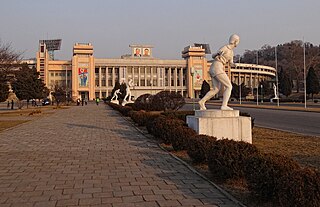This page is based on this
Wikipedia article Text is available under the
CC BY-SA 4.0 license; additional terms may apply.
Images, videos and audio are available under their respective licenses.

Kim Jong-il was the second leader of North Korea. He ruled from the death of his father Kim Il-sung, the first leader of North Korea, in 1994 until his own death in 2011. He was an unelected dictator and was often accused of human rights violations.

Kim Jong-nam was the eldest son of North Korean leader Kim Jong-il. From roughly 1994 to 2001, he was considered the heir apparent to his father. He was thought to have fallen out of favour after embarrassing the regime in 2001 with a failed attempt to visit Tokyo Disneyland with a false passport although Kim himself said his loss of favour had been due to advocating reform.

Kim Nam-Il is a retired South Korean footballer who played as defensive midfielder. He was virtually unknown before he became a superstar for his impressive defensive displays for his national team during the 2002 FIFA World Cup.

Kim Il-sung Stadium is the name of a large multi-purpose stadium located in Pyongyang, the capital city of the Democratic People's Republic of Korea.

Kim Jong-un is a North Korean politician serving as Supreme Leader of North Korea since 2011 and also serving as the Chairman of the Workers' Party of Korea since 2012. Kim is the second child of Kim Jong-il (1941–2011) and Ko Yong-hui (1952–2004). He is the grandson of Kim Il-sung, who was the first leader of North Korea from 1948 to 1994. Kim is the first North Korean leader who was born after the country's founding.
South Korea national amateur boxing athletes represents South Korea in regional, continental and world matches and tournaments sanctioned by the Amateur International Boxing Association (AIBA).

Kim Il-sung was the first leader of North Korea which he ruled from the country's establishment in 1948 until his death in 1994. He held the posts of Premier from 1948 to 1972 and President from 1972 to 1994. He was also the leader of the Workers' Party of Korea (WPK) from 1949 to 1994. Coming to power after the end of Japanese rule in 1945, he authorized the invasion of South Korea in 1950, triggering an intervention in defense of South Korea by the United Nations led by the United States. Following the military stalemate in the Korean War, a ceasefire was signed on 27 July 1953. He was the second longest-serving non-royal head of state/government in the 20th century, in office for more than 48 years.
Kim Hyung-Il is a South Korean footballer who currently plays as defender for Navy.
Ji-won, also spelled Jee-won or Chi-won, is a Korean unisex given name. Its meaning differs based on the hanja used to write each syllable of the name. There are 46 hanja with the reading "ji" and 35 hanja with the reading "won" on the South Korean government's official list of hanja which may be registered for use in given names. Though it has never been one of the top 10 names for newborn boys or girls in South Korea, in the 2000s it began to become more common, as part of a rising trend of giving unisex names to babies.

The Kim dynasty, referred to in North Korea as the Mount Paektu Bloodline, is a three-generation lineage of North Korean leadership descended from the country's first leader, Kim Il-sung. In 1948, Kim came to rule the North after the end of Japanese rule
in 1945 split the region. He began the Korean War in 1950 in an attempt to reunify the Korean Peninsula. In the 1980s, Kim developed a cult of personality closely tied to their state philosophy of Juche, which was later passed on to his two successors: his son Kim Jong-il and grandson Kim Jong-un.
Jung-il, also spelled Jeong-il, Jong-il, or Chung-il, is a Korean masculine given name. Its meaning differs based on the hanja used to write each syllable of the name. There are 75 hanja with the reading "jung" and ten hanja with the reading "il" on the South Korean government's official list of hanja which may be registered for use in given names. One pair of hanja used to write this name (正一) also correspond to a number of different Japanese given names, including on-yomi such as Seiichi and Shōichi, kun-yomi such as Masakazu, and mixed readings such as Masaichi.
Won-il is a Korean masculine given name. Its meaning differs based on the hanja used to write each syllable of the name. There are 35 hanja with the reading "won" and ten hanja with the reading "il" on the South Korean government's official list of hanja which may be used in given names.
Kim Cheol-ho or Kim Chŏl-ho (김철호) may refer to:
Kim Sung-il (김성일) may refer to:
Kim Seung-il may refer to:






